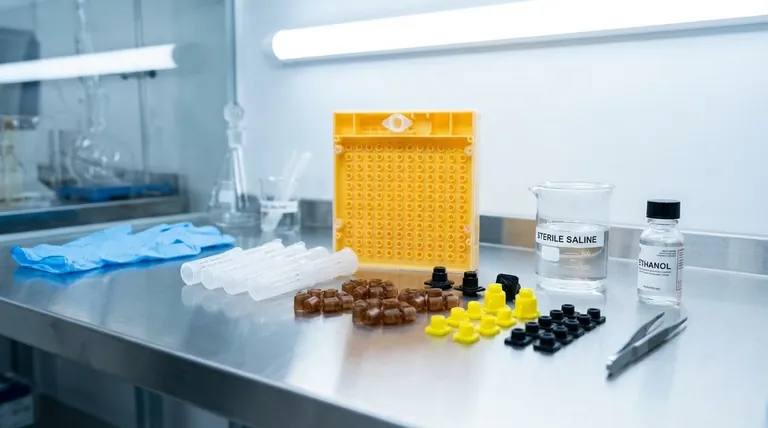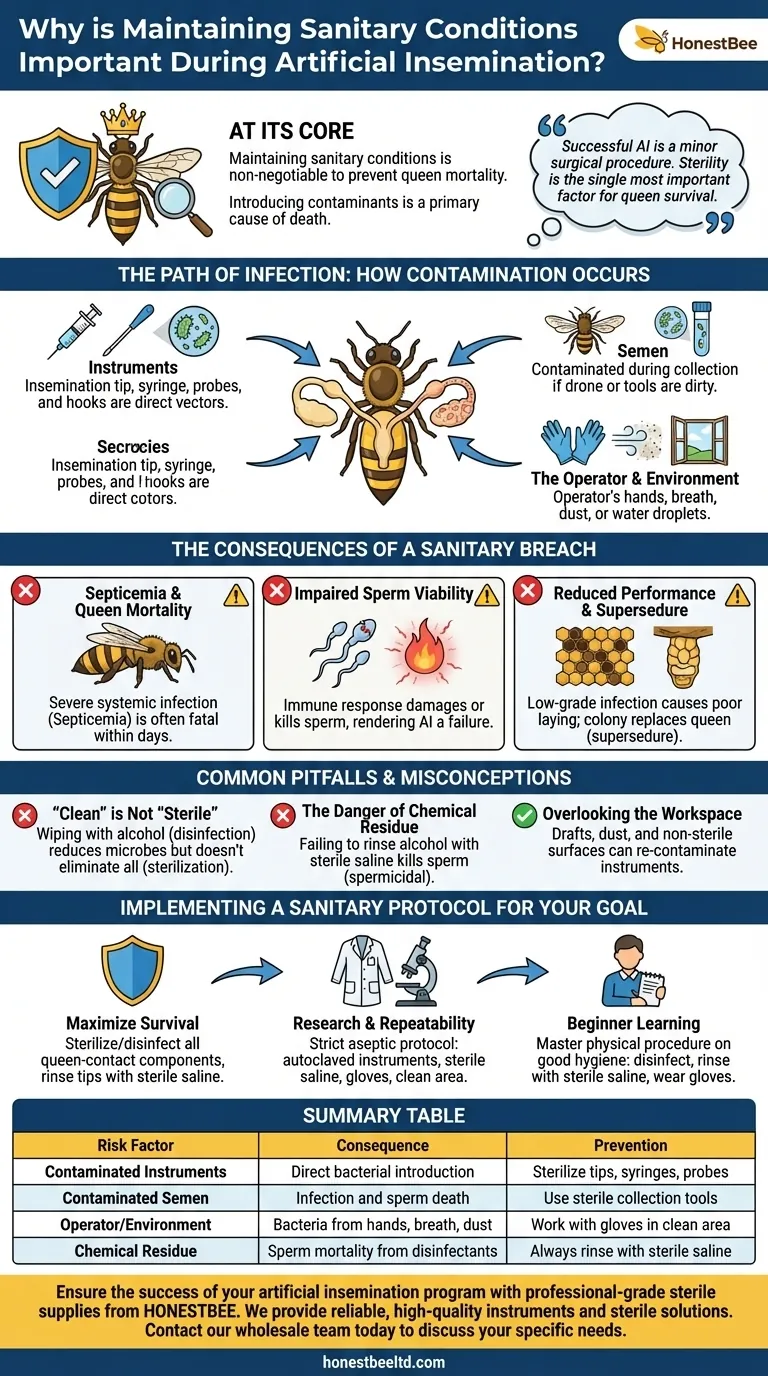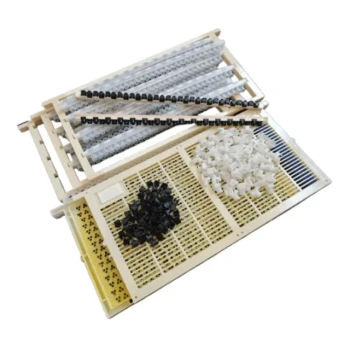At its core, maintaining sanitary conditions during artificial insemination is non-negotiable because introducing contaminants is a primary cause of queen mortality. The process bypasses the queen's natural defenses, and any bacteria introduced via semen, instruments, or the operator's hands can lead to a fatal internal infection.
Successful artificial insemination is not merely a mechanical procedure; it is a minor surgical one. Approaching it with a focus on sterility is the single most important factor in ensuring the queen not only survives but thrives post-procedure.

The Path of Infection: How Contamination Occurs
To prevent contamination, you must first understand the pathways by which microbes can enter the queen's reproductive system. The AI process creates a direct route for infection.
The Queen's Vulnerability
A queen bee's reproductive tract, specifically her median and lateral oviducts, is an internal, sterile environment. The insemination instrument bypasses all of her external anatomical and physiological barriers, delivering semen directly into this sensitive area. This environment has no natural mechanism to fight off a sudden bacterial invasion.
Primary Sources of Contamination
Contamination almost always originates from one of three sources.
- Instruments: The insemination tip, syringe, probes, and hooks are the most direct vectors for infection. Any microbe on these surfaces will be placed directly into the queen.
- Semen: Semen can become contaminated during collection if the drone's exterior is dirty or if the collection tools are not sterile.
- The Operator & Environment: The operator's hands are a major source of bacteria. Likewise, dust particles, water droplets, or even the operator's breath can carry microbes that settle on sterile equipment.
The Consequences of a Sanitary Breach
A failure in sanitary protocol can lead to outcomes ranging from reduced performance to the complete loss of the queen.
Septicemia and Queen Mortality
This is the most severe and immediate consequence. Bacteria introduced into the oviducts can multiply uncontrollably in the nutrient-rich environment of the hemolymph (insect blood), leading to a systemic infection known as septicemia. In most cases, this is fatal to the queen within a few days.
Impaired Sperm Viability
Even if the queen survives, the presence of bacteria can trigger an immune response and inflammation within the reproductive tract. This hostile environment can damage or kill the sperm before it can migrate to the spermatheca for storage, rendering the insemination a failure.
Reduced Performance and Supersedure
A low-grade, non-lethal infection can still have a profound impact. It can damage the queen's ovaries or oviducts, leading to a poor laying pattern or a complete inability to lay. A colony will quickly detect a failing queen and replace her through supersedure, wasting the time and resources invested in her.
Common Pitfalls and Misconceptions
True aseptic technique requires more than a simple wipe-down. Understanding these common mistakes is critical for building a reliable process.
"Clean" is Not "Sterile"
Wiping an instrument with 70% alcohol is a form of disinfection, which reduces the number of microbes. It is not sterilization, which eliminates all microbial life. While disinfection is better than nothing, it is not a guarantee against infection.
The Danger of Chemical Residue
A common mistake is failing to remove chemical agents after disinfection. Alcohol, for instance, is spermicidal. If an insemination tip is only wiped with alcohol and not thoroughly rinsed with a sterile saline solution, the residual alcohol can kill the sperm on contact, dooming the procedure to failure.
Overlooking the Workspace
Many operators focus intensely on the instruments while ignoring the surrounding environment. A sterile tip can be instantly contaminated by a draft from an open window, dust from a shelf, or a non-sterile surface on the workbench. Your workspace is an extension of your instruments.
Implementing a Sanitary Protocol for Your Goal
Your approach to sanitation can be scaled based on your objectives. The fundamental principles, however, remain the same.
- If your primary focus is maximizing queen survival: Sterilize or meticulously disinfect all components that make contact with the queen or the semen, paying special attention to the insemination tip and ensuring it is rinsed with sterile saline.
- If your primary focus is research and repeatability: Adopt a strict aseptic protocol. This includes using sterilized instruments (autoclaved if possible), sterile saline solutions, gloves, and performing the work in a clean, draft-free area or a laminar flow hood.
- If you are a beginner learning the technique: Master the physical procedure on a foundation of good hygiene. Start with a rigorous protocol of disinfecting all tools with alcohol, followed by a thorough rinse with sterile saline, and always work with clean hands or gloves.
Mastering sanitary technique is not an optional chore; it is the foundation upon which successful and repeatable artificial insemination is built.
Summary Table:
| Risk Factor | Consequence | Prevention |
|---|---|---|
| Contaminated Instruments | Direct introduction of bacteria into queen's reproductive tract | Sterilize insemination tips, syringes, and probes |
| Contaminated Semen | Infection and sperm death | Use sterile collection tools and practices |
| Operator/Environment | Introduction of bacteria from hands, breath, or dust | Work with gloves in a clean, draft-free area |
| Chemical Residue | Sperm mortality from disinfectants like alcohol | Always rinse instruments with sterile saline after disinfection |
Ensure the success of your artificial insemination program with professional-grade sterile supplies from HONESTBEE.
We understand that commercial apiaries and beekeeping equipment distributors cannot afford losses from queen mortality. Our wholesale-focused operations provide the reliable, high-quality instruments and sterile solutions you need to implement a fail-safe sanitary protocol.
Let us support your success. Contact our wholesale team today to discuss your specific needs for insemination tips, syringes, sterile saline, and more.
Visual Guide

Related Products
- Nicot Queen Rearing Kit for Beekeeping and Grafting in Nicot System
- Jenter Queen Rearing Kit Complete Set for Bee Breeding
- No Grafting Queen Rearing Kit: System for Royal Jelly Production and Queen Rearing
- Plastic Beekeeping Honey Bee Larvae Grafting Tools for Queen Rearing and Chinese Grafting
- Wooden Queen Bee Excluder for Beekeeping
People Also Ask
- Why are high-precision constant temperature incubation or control systems necessary for honeybee artificial insemination?
- What methods are used to restrain queens during artificial insemination? Discover the Industry Standard for Safe Queen Handling
- Why is a CO2 anesthesia system necessary for queen bee insemination? Ensure Surgical Safety and Faster Egg-Laying
- What are the advantages of honey bee artificial insemination instruments? Unlock Precision Breeding Control
- Why are semen mixing tools vital for Pooled Semen Insemination (PSI)? Achieve Genetic Consistency in Honeybees
- How do high-precision artificial insemination instruments contribute to solving the problem of low honey yield per colony?
- How does high-precision artificial insemination equipment contribute to the improvement of bee breeds? Genetic Mastery
- What is the primary function of medical-grade CO2 in bee insemination? Enhance Queen Success & Egg-Laying



















